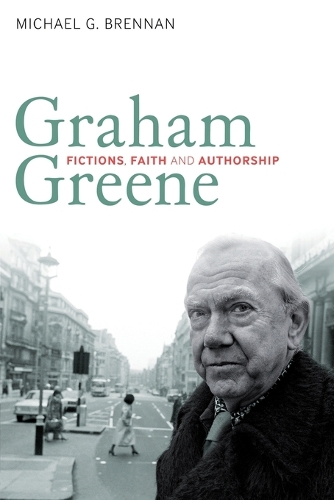
Graham Greene: Fictions, Faith and Authorship
(Paperback)
Available Formats
Publishing Details
Graham Greene: Fictions, Faith and Authorship
By (Author) Professor Michael G. Brennan
Bloomsbury Publishing PLC
Continuum International Publishing Group Ltd.
18th March 2010
United Kingdom
Classifications
Professional and Scholarly
Non Fiction
Literary studies: c 1900 to c 2000
823.912
Physical Properties
Paperback
192
Width 154mm, Height 232mm, Spine 16mm
Description
In this significant rereading of Graham Greene's writing career, Michael Brennan explores the impact of major issues of Catholic faith and doubt on his work, particularly in relation to his portrayal of secular love and physical desire, and examines the religious and secular issues and plots involving trust, betrayal, love and despair. Although Greene's female characters have often been underestimated, Brennan argues that while sometimes abstract, symbolic and two-dimensional, these figures often prove central to an understanding of the moral, personal and spiritual dilemmas of his male characters. Finally, he reveals how Greene was one of the most generically ambitious writers of the twentieth century, experimenting with established forms but also believing that the career of a successful novelist should incorporate a great diversity of other categories of writing. Offering a new and original perspective on the reading of Greene's literary works and their importance to English twentieth-century fiction, this will be of interest to anyone studying Greene.
Reviews
'A first-rate study' The Tablet
'Brennan clearly shows it is impossible to understand Greene's work without appreciating his faith, however unconventional that faith may have been' Church of England Newspaper
'A brilliant contribution to our understanding of a complicated man and author.' Methodist Recorder
Brennan offers a concise and well-researched study that focusses on the centrality of religion in Greene's fictions, weaving together how the conflict between faith and doubt, hope and despair and love and betrayal inspired his intellectual life and creativity.' -- English Studies
Although Graham Greene was widely acclaimed as a Catholic writer, he preferred to regard himself as a writer who happened to be a Catholic. In this enlightening study Michael Brennan shows how, throughout his long career, Greene's literary imagination was pervaded by themes, images and situations drawn from Catholicism, and not only in the works where he deals with overtly Catholic subjects.' - Bernard Bergonzi, Emeritus Professor of English, University of Warwick, UK
'Tracing Greene's development in careful detail, Brennan's analysis reveals the ways in which religious and literary preoccupations play off against and mutually inform one another: an important reassessment of a fascinating writer.' The Scotsman
'Brennan validates the previously negative assertion that Greene used Catholicism for ... literary ends [and] demonstrates what made Greene such an important figure' The Catholic Herald
Brennan's scholarly study manages to ensure that people of all faiths, and none, will be able to read Greene through new eyes and better understand his paradoxical relationship with Catholicism.' The Irish Times
Brennan's monograph is short, lucid and convincing ... It would be a pity to be excommunicated from the full meanings of Greene's fiction. Brennan's treatise will help even non-Catholics to get there.' The Financial Times
Author Bio
Michael G. Brennan is Professor of Renaissance Studies at the University of Leeds, UK. He is the author of Graham Greene: Fiction, Faith and Authorship (Continuum, 2010).
